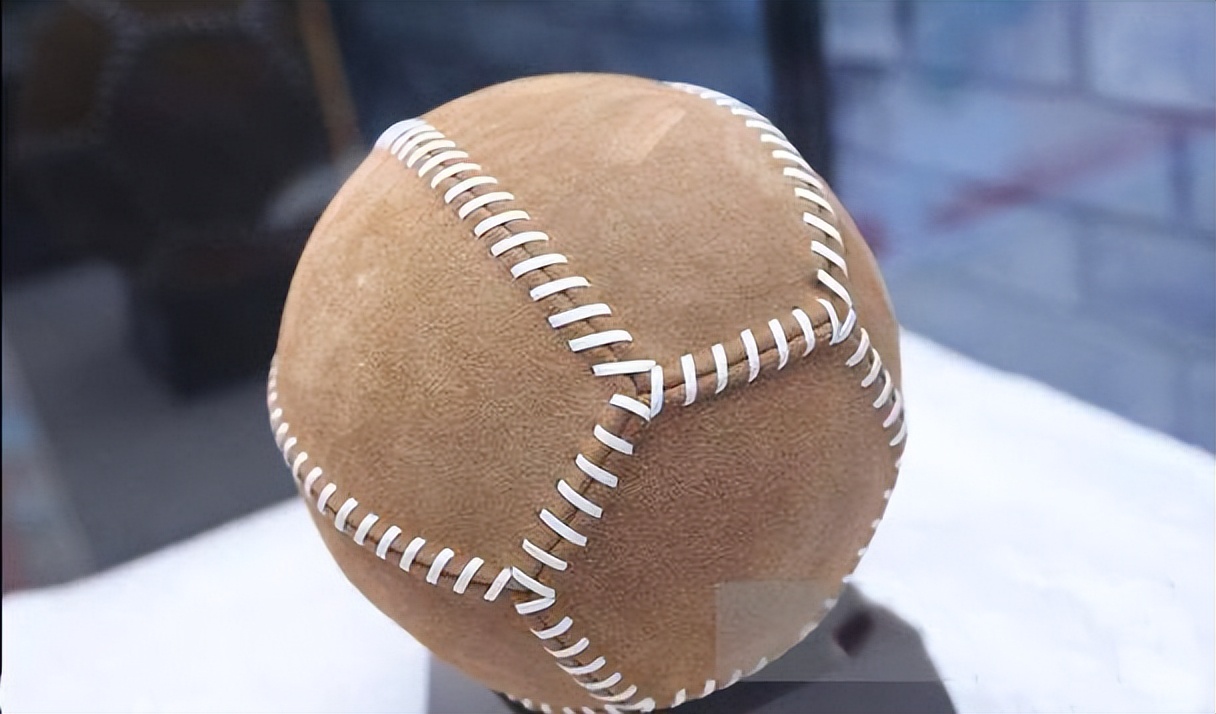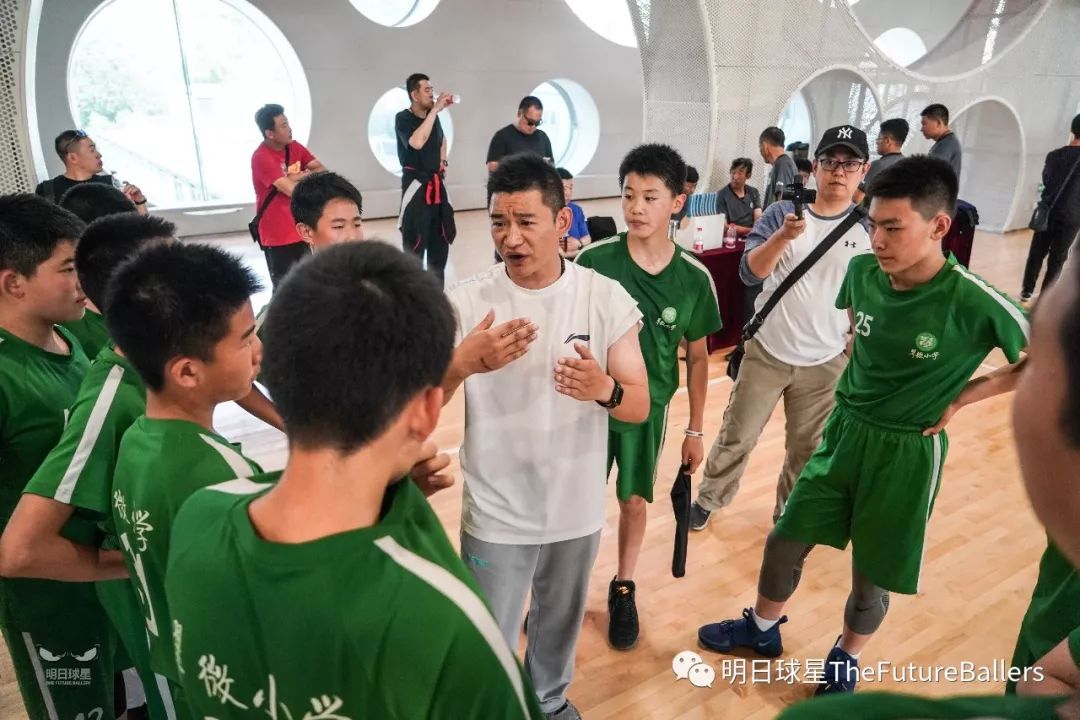作者:新华社每日电报记者Yu Pei,Zhang GE,Zhang Yujie,为什么要问Yuan Huijing
如何在两千多年前被发现并彼此解密的“乘法公式”如何?为什么“ Liye Qin Bamboo Shop”称为“ 21世纪我国家最重要的考古发现之一”和解释QIN王朝的“百科全书”?当我去Nanchang在Haihunhou王国废墟博物馆“入住”时,除了整个黄金之屋,还有哪些其他宝贵的文本标记?甘努(Gansu)的“洪山汉(Hunquan Han Bamboo Slips)”的意外发现概述了古老的丝绸之路上的故事...
自20世纪以来,在过去的一个世纪中,我所在国家发掘出的竹滑片的新材料已发表,并不断推广新的研究。一些令人震惊的发现极大地补充了过去经典的缺点,帮助我们更准确地了解了交战状态时期的历史外观和发展背景,QIN,HAN,WEI和JIN朝代。由湖南,湖北,甘努和江西代表的“大竹子和字母省”改进了保护方法,探索了新颖的展览方法,并促进了“变成冷热”的竹制滑移文化,以便公众可以更接近长期而深刻的中国文明。

3月6日,工作人员在新博物馆的新博物馆的Chu Slip展览馆中展示并使用了互动设备。摄于Hu Jingwen,新华社每日电报记者
考古发现的“百科全书”
在2023年的仲夏时代,在中间状态时期,从一个楚祖墓中出土了大量的竹条,Qinjiazui M1093是中期状态时期的Chu墓,是一个坟墓,在我的国家 /地区最多的交战状态的墓穴中。
发掘了竹片后,考古工作人员立即将其正确提取,并将其运送到“国家文化遗产管理局的主要科学研究基础”,以供室内拆开,保护和分类,以供出土的木质漆器保护保护。 “保存这批简化的竹滑板不是很好。它们基本上处于竹滑片饱和纤维的临界状态。此外,它们被土壤和其他发现的物体所压缩。竹片被严重损坏并严重损坏,这极大地增加了揭开和剥离竹子的困难。”他回忆说,他是吉木文化遗产保护中心的竹滑道修理工。
她说的是窥视这批竹条的价值内涵的第一步。最后,在考古学家和文化安全人员的合作下,根据最初的自上而下的竹条滑动的重叠顺序,将一批超过3,900个竹片拆除。最初在一个小组中扫描了十件,并介绍了30,000多个单词!此后,研究人员立即仔细地确定了计算机屏幕上文本的内容。实际上,其中一个破碎的竹条在上面写着的“数字” - “ ...两个,五个,七个,二十和八,三,七,二十,二十和一个...”这是已经存在了2300多年的“乘法公式”!这款竹子的纸条,编号为1645,被专家暂时命名为“九种艺术”,并精心挑选进入清洁,保护,研究和展示的“绿色频道”。
Qinjiazui的Chu剑的“九九艺术”比99桌子中最早已知的Liye Qin剑早一个世纪。这是在考古时报中发现的最早的乘法公式。它在一定程度上表明,它在一定程度上表明了它在CHU状态中的广泛使用,在该时间时代的发展是重要的。 Qinjiazui公墓考古项目负责人兼Jingzhou博物馆副主任Yang Kaiyong说。
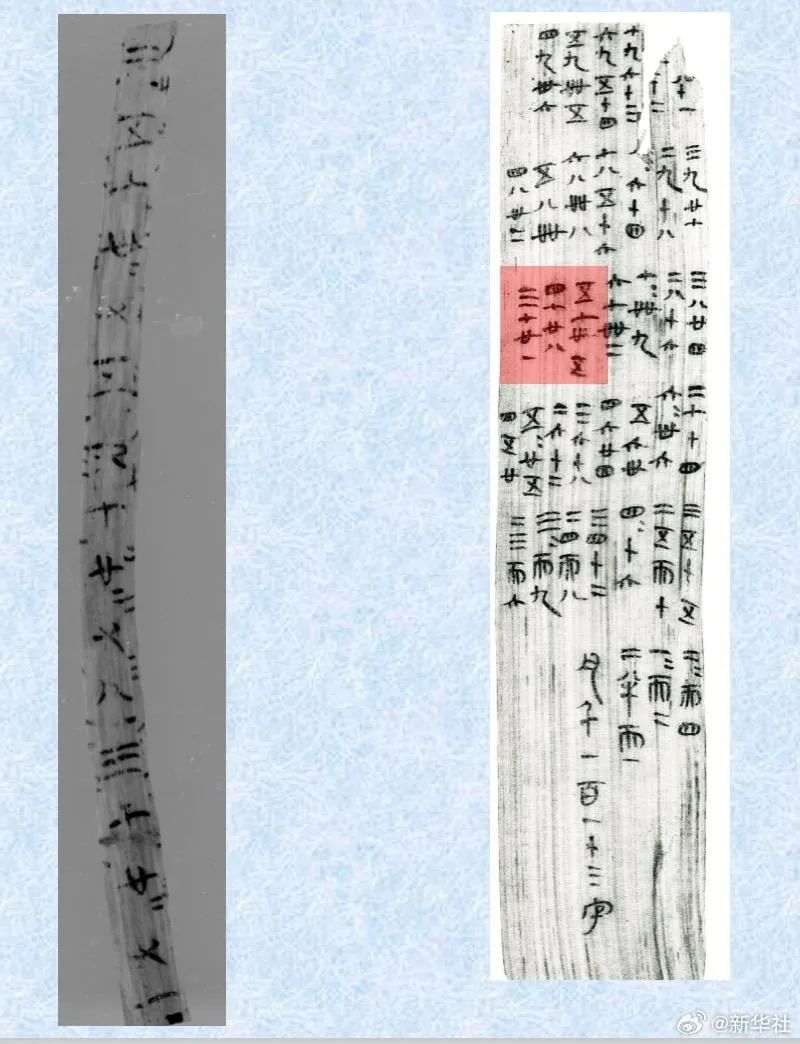
比较Qin Jiazui的“九九艺术”(左)和Liye的QIN滑倒“九张桌子”(右)。 Jingzhou博物馆提供的照片
在QIN和QIN和HAN王朝期间,乘法公式是数学学习的基本知识,在日常生活中广泛用于计算人类,材料,资产等,并且在诸如Xunzi和Guanzi等经典中已经记录了乘法公式的用例。
初步研究表明,交战状态的内容Chu Bamboo从M1093发掘出来,Jingzhou的Qinjiazui公墓涉及许多领域,例如“书籍”,“语言”,数学,医学,畜牧业,畜牧业,日本文学,日本书籍等。的确是“ Incyclopedia”的“ Incyclopedia”,是我乡村的古代书籍。它为Qin前时期的历史,文化和思想提供了宝贵的新材料,并具有重要的价值,例如考古研究,经典分类,文化文化保护,展示和利用。该考古项目被选为2023年国家文化遗产管理局的“考古中国”项目,入围了2023年对“该国十大新考古发现”的初步评估,并于2023年赢得了“ Hubei中的六个新考古发现”。
时间可以追溯到2002年6月。在Youshui河的河岸上,位于八个侧面的山脚下,列伊古城。考古学家在古老的列伊(Liye)的废墟中发现了一条竹子,里面有一个古老的井中的单词。 “在古老的井中找到单词的含义是非凡的。”湖南省文化文物与考古学研究所的研究员张春隆回忆说,当时,下雨在下雨,在地下拯救竹条的最重要的事情是时间。
Zhang Chunlong和Long Jingsha是Xiangxi文化遗物管理局和Miao自治区文化遗物管理局的考古专家,迅速制定了救援和挖掘计划。井井有条,长长的Jingsha与其他运营商的时间竞争,根本不敢懈怠。
一分钟一分钟的时间,雨继续渗入地面,井墙上出现了裂缝。发掘工作仍然深入,一旦古老的井倒塌,后果就无法想象。每个人的心都挂在喉咙里,焦虑和期待。最终,当长Jingsha小心翼翼地再次剥去一层泥土时,他的指尖碰到了一些常规的木屑。他慢慢地从木屑上包裹的泥浆上剥皮,再次看到木屑上的单词。
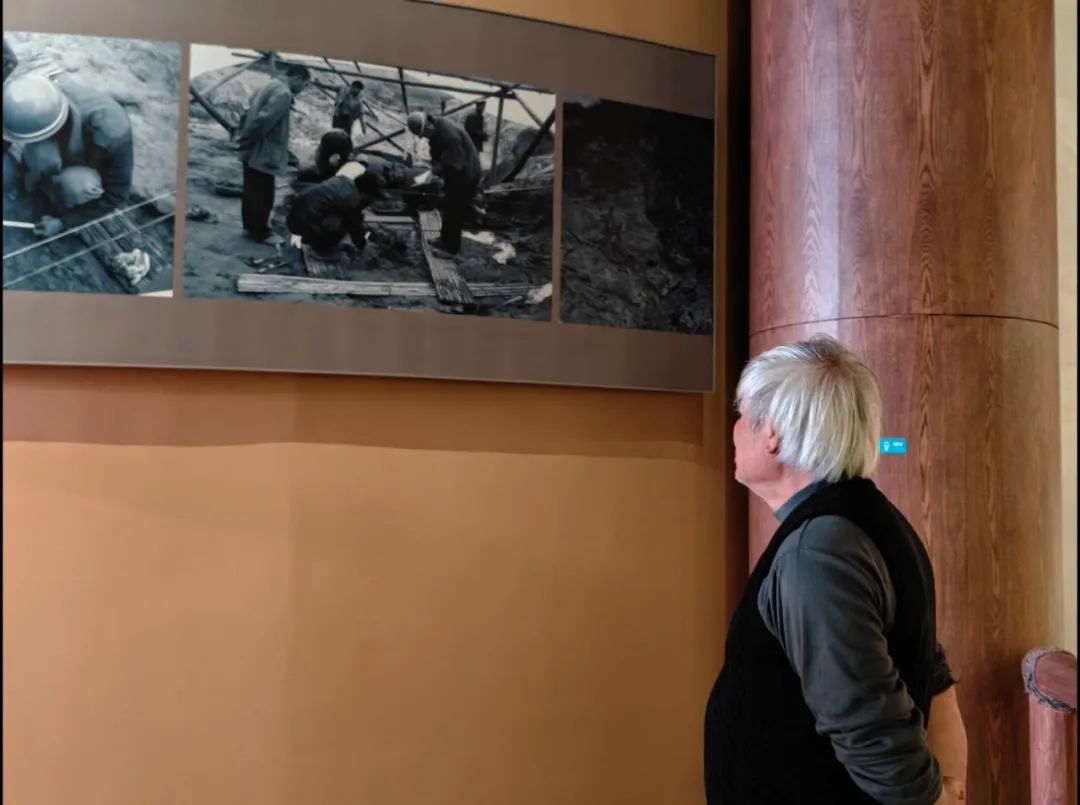
2024年4月8日,Long Jingsha凝视着Liye Qin Slip Museum的2004年Qin Slip发掘地点。照片由新华社每日电报记者Zhai Xiang
令人惊讶的是,一天之内将300多个竹条运到地面上。竹子很清楚地说明了秦朝的日期,而地名“ Qianling”也经常出现在竹条上。似乎向人们证明,这座神秘的城市Liye的古城是Qin王朝的Qianling县小镇。有一会儿,考古团队对这个突然的重大发现深感震惊。
从那时起,大约36,000个秦竹滑片出土了,其中大部分来自第一井,这是QIN竹滑片的十倍。从六个王国统一到秦朝去世前一年,很少有记录一年。
这批不起眼的木屑已成为子孙后代的一大批信息,以了解秦人的现实生活。 “九个九个桌子”中的一个成为QIN前时期乘法公式的经验证据,而“二,一半,一则”的书面记录证明当时有小数点操作,并且基于“九九个九九个九艺术”的创新发展。
“看起来像是专利的皮肤,柔软而腐烂的面条”是Haihun Bamboo Slips给考古团队成员的第一印象。 2015年11月,在刘海(Nanchang)汉恩(Hanchang)的haihun侯爵(Haihun of Haihun of He He)的文件档案档案中以相对集中的方式以相对集中的方式散发出了5,200多个竹条和170多个木滑板。 Yang Jun是Haihunhou Tomb考古发掘团队的负责人,也是江西省文化文物与考古研究所的研究人员,他介绍了Haihunhou Tomb是典型的南部泥墓。在金王朝东部,这里发生了一场大地震,墓室倒塌了,整个棺材室都被浸入水中。由于光湖湖的光,温度和水位变化的影响,竹滑片的保存非常腐烂,并且文化保护工作一直持续到今天。
“为了尽快掌握竹条的内容,并向公众宣布,我们与北京大学的出土文档研究所一起进行了初步的汇编,并根据其清洁竹条时扫描了基于用于文化保护目的的红外照片的文本材料。”杨朱告诉记者,Haihun Bamboo Slips目前是一批汉朝竹片,在一个坟墓中发掘了最多的,在该国单一的考古过程。西汉王朝时期的丰富历史信息再次使世界像坟墓中的宝藏一样惊讶。
迄今为止,在甘努省已经发掘了60,000多个竹条。其中,最特别的考古发现不仅出土了20,000多个汉竹滑片,而且还揭示了汉朝古老的丝绸之路上的一家官方邮局接待机构。
在1987年秋天,经过许多考古调查,他是甘努省文化文物与考古研究所的研究图书馆员Shuangquan,在甘苏省朱昆市邓豪恩市的戈宾沙漠上拾起了完整的油封。他从土壤中擦掉,清楚地看到了六个整洁的官方脚本,上面写着“悬挂在凉亭里”。发现了汉朝的Xuanquanzhi遗址。
从1990年到1992年,在Xuanquanzhi地点进行了考古发掘。竹单被埋在该地点的各个区域。这些竹条与沙子和柴火混合在一起,墨水单词被隐约地露出,并与古代人的生活的遗物一起出土。该地点西部的灰色区域是最发现的竹条,总共有7,000多个木制滑动。
“我们打开了Xuanquanzhi的大门已有2000多年了。我们看到了毫无生气的博物馆,倒塌的房屋,掉落的墙壁,墙壁折断的门和窗户,纸破碎了……一切似乎都腐烂了。这是什么单位?这里的人们如何生活?” Shuangquan挖掘的越深,他对这条丝绸之路的过去就越好奇。
Shuangquan介绍了后来进行分类后,“ Chunquan Han Slip”不仅是汉朝政治,经济,文化,交通等许多方面的记录,而且是研究汉和西方地区的36个国家之间的交流的第一手信息,张Qian在西方地区开放了西方地区,以及丝网的界面,以及创建的运营,以及创建的运营,以及该公路的运作,以及该公司的运作,并在运营中,并构成了丝绸之路。
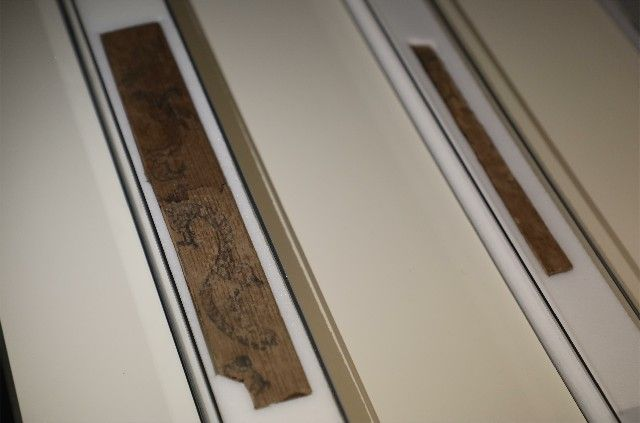
这是Han Dynasty悬挂的春季龙和凤凰城的木滑道,现在在Gansu Bamboo Slips博物馆中。新华社记者Duolei摄
关于“传播时空”的古老书籍
什么是“竹条”?在中国古代广泛使用纸之前,竹条是主要写作的主要载体。从考古发现可以看出,竹片主要在交战时期,秦王子,甚至魏和金王朝都流行。它通常继承了甲骨文骨铭文和青铜铭文,并打开了基于纸张的手稿和雕刻文档。在中国文明的发展和继承的背景下,它具有重要的历史地位和独特的学术价值。
竹子和滑移文件大致分为两类:文档和经典。就当时的打算和流动状况而言,前者在有限的时间内将前者转移到特定范围或路径内的阅读地点;后者是对“跨时间和太空通信”的追求。
“值得注意的是,如果文件被传递给后代,它们将淡入其直接和实用的颜色,并将其转变为历史材料和文化资源,从而将其转变为经典。” Chen Wei, senior professor of humanities and social sciences at Wuhan University, director of the Bamboo and Silk Research Center, and member of the Expert Committee of the "Ancient Characters and the Inheritance and Development Project of Chinese Civilization" said that the unearthed bamboo slips documents from the Warring States Period, Qin, Han, Wei and Jin Dynasties are rare documents that record the development and evolution of Chinese civilization and should be included in the category of today's ancient books,就像意识形态和文化经典一样。

细长的竹子和木材的细薄片很简单,而相对较宽的竹板和木板是滑动的。由于材料易于获取并且易于制作和写作,因此可以将它们连接到带有绳索的书籍中以携带长文件。他们还可以通过牙齿雕刻,护身符,密封和依恋来添加反遇到的和机密性功能。因此,在纸张通过之前,竹条是主要写作载体。
“只有阴的祖先才有书籍和经文。”由于角色“生”类似于一件经文,因此大多数学者认为竹条已在商王朝中使用。 “歌曲书:汽车“呼唤探险””是否会不考虑返回并担心这本简化书籍的士兵”; “ Zuo Zhuan”记录了徐武的叛乱25年,”南方一家听说,所有伟大的历史都死了并持续了过去。
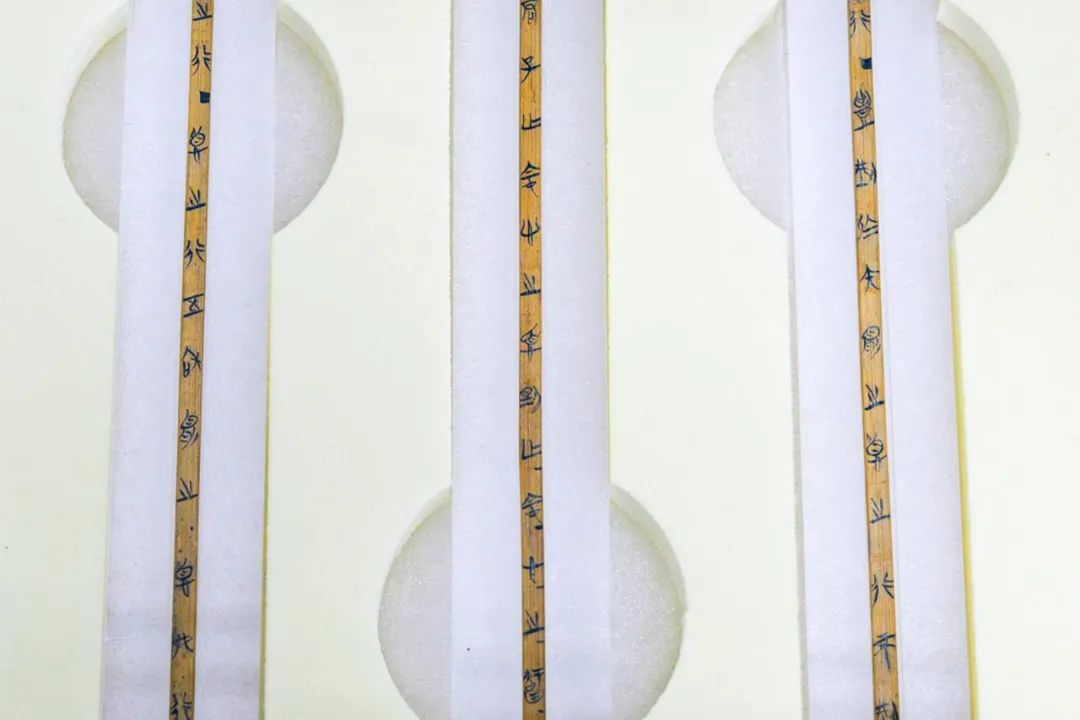
这是3月6日拍摄的新的金门博物馆仓库中存储的原始楚竹滑片。
目前发现的最早的物理物体是从中间和晚期的时期中的楚竹滑动,以及秦,汉,魏和金王朝的大量竹片被发现。西部王朝的纸很多次被发现。文字或地图也可以在Juyan,Dunhuang,Fangmatan和其他地方找到,这些文字显然用于写作。一些专家猜测,在纸上成为东部后期官方写作的载体之前,仍在大量使用竹条。
“银”和“银”之间也存在相对不同的特征和功能差异。竹子在我的国家南部很丰富,因此目前发现了大多数竹片,而西北地区的气候干燥,竹子较少,大多数是简单的木头。这两条线比简化的宽度略宽,通常约为2厘米,宽度是一条线的两倍。因为每个简化都是用两行编写的,所以它被称为“两行”简化,可以单独组成和使用。这些滑块比“两行”滑动更宽。有些可以宽6厘米。长度大多与普通滑动相同。它们中的大多数是由木制制成的,用于写信,合同或复制医疗处方,日历相册等。墓中发现的大多数滑块用于记录与它们埋葬的物品的目录。
Gansu Bamboo Slips Museum的组织和研究部主任Xiao Congli提出,为了更好地防止泄漏,必须将书面的竹条与结绑在一起,并用粘土密封。尤其是在官方文档撰写之后,为了防止在传输过程中私下拆除其,应覆盖一个名为“检查”的木板,并用正式文件覆盖竹条,然后将检查和官方的文档竹子绑在绳索上,在检查上盖上密封泥,然后在检查泥上盖上密封的泥浆。这也是“沉默口”的成语的起源。此外,用竹条写的古书籍首先卷起来。阅读书籍时,您必须打开卷,这称为“开放是有益的”。
在Oracle Bone铭文中,中文角色“生”看起来像是一个字符串,它一一连接简单的字母。为了固定连接时的竹条,三角形的嘴刻在竹条的侧面。根据简化脚本的长度,有两个,三个和四个以上,超过四个。因为孔子喜欢阅读《变化书》一书,所以他将与该书相连的编织绳子扎根。后来的几代人使用成语“ Wei Bian San Jue”来描述他在阅读方面的辛勤工作。
直到今天,某些书的写作格式和写作方法仍然继承了竹条时期形成的传统,直到今天,竹片就已经传递了许多成语和典故。例如,“挑选”,“零件”,“编辑”,“几篇著作”,“ WEI的三篇文章”都与竹条的形状有关; “切断”,“历史”,“竹条的不扎根和写作”与竹片的生产和材料有关; “删除和修改”,“刀片和笔”与竹滑道时代的文具和刀子有关; “合同”,“字母”,“密封”等与竹条时代的文档系统有关。

这是从邓仓马旺旺的汉朝灯塔遗址发掘出来的竹条。目前,它收集在甘西竹剑博物馆(数据照片)中。新华社
中国智慧在“不明智”和“小词”中
交战国家时期和秦朝王朝在我国历史演变中处于一个主要节点。 “在所有国家和谐地团结所有国家”的上王朝朝着实施县制度的统一帝国和汉王朝的统一。私立学校蓬勃发展,著作出现了。当时创建的规则,法规和经典是从过去继承的,并以深远的影响开放了未来。作为这个历史过程的原始记录和直接遗迹,竹单具有特殊价值,无法与过去的文献进行比较。
调查表明,在交战状态期间,总共有82批Chu竹滑片,从湖北六王朝发掘出了25,000多片竹片,估计超过500,000个单词。其中,在湖北区发现的Baoshan Chu剑,陀螺剑剑,Shuihudi Qin Swords,Zhangjiashan Han Swords等都是震惊了国内外学术界的主要发现。由贡德·乔竹店(Guodian Chu Bamboo)店领导的文化经典,科学和技术文件,例如Zhangjiashan Han Bamboo Shop“算术书”,以及在这个省发现了诸如Sleephy Hudi Qin Bamboo Shop之类的法律文件。他们具有不可替代的文献价值,用于探索儒家主义的早期形式,进化和传播以及各种哲学家的经典。
在Haihunhou墓中发掘出的5,200多个竹滑片中,最大的比例是儒家经典及其教义,包括几种丢失的版本或更早版本,这些版本具有极高的学术价值,可用于研究儒家及其经典作品的传播和演变。北京大学发掘文档研究所主任朱冯(Zhu Fenghan)说,超过1200张“歌曲书”为人们提供了古代版本的“歌曲书”,其中包含今天看到的最幸存的角色。例如,孔子的分析中有500多首诗,其中包含“ Zhidao”的标题以及当前版本中未找到的一些简单文本。有100多个“春季和秋季年鉴”,这是考古学上发现的春季和秋季年鉴的最早物理对象,并提供了有价值的信息以理解这一历史。
明智而浪漫的楚心人喜欢音乐。在过去的几十年中,Chu的考古学发现了许多乐器,例如铃铛,鼓,QINS,ZITHERS和装饰图案,描绘了音乐和舞蹈场景,但找不到音乐得分。 2021年,考古学家在旺杜(Jingzhou)的旺吉(Wangjiazui)的楚祖(Wangjiazui)中发现了3,200多个交战状态,其中160个包含音乐符号的竹片被称为“音乐得分”。它的简化文本主要由天上的茎和一些简单的符号组成,被推测是丰富的节奏。他们的出色使后代可以“聆听” 2000多年前的音乐。
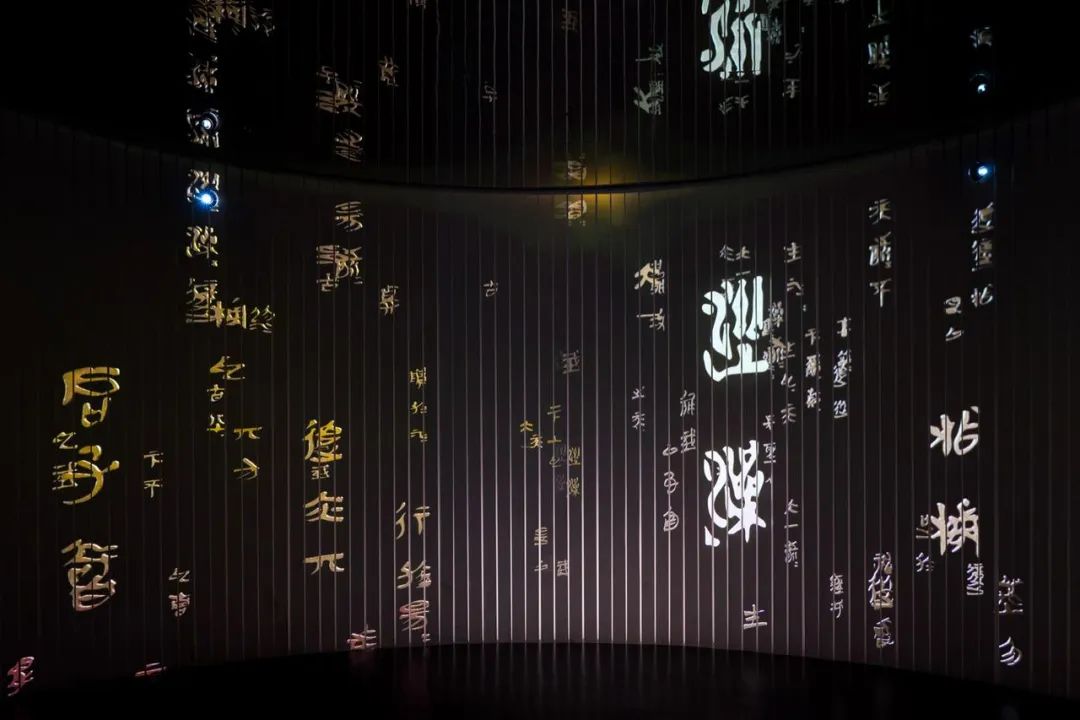
这是Jingmen Museum在Guodian Chujian展览馆中的一个场景(照片于3月6日拍摄)。摄于Hu Jingwen,新华社每日电报记者
Chen Wei指出,由于出土的数量不足和大部分分散,竹片在学术研究中的重要性通常仅仅是为了证明历史和补充历史,并且处于支持和补充地位。现在,由于数据的积累,尤其是大量和保存完好的大量材料,例如shuihudi Qin滑倒,Liye Qin Slips,Zhangjiashan Han Slips和Hujia Caochang Han Slips。通过适当的分类和相互调查和校对,竹片和文件已成为边境防御系统,文件系统,法律体系等领域研究的主要历史基础,甚至是唯一的信息来源。
在湖南,考古发掘中发现了20多批批次,超过20万批竹片,占该国发掘出的竹滑片总数的三分之二。 Liye Qin Bamboo Slips揭示了Qin王朝基层社会的真实面孔。 Mawangdui Han Bamboo Slips,Zoumalou Western Han Bamboo Slips和五月广场的东部汉竹滑道记录了汉朝的社会习俗,社会和政治制度; Zoumalou Wu Bamboo Slips在三个王国时期展示了长沙人的生活场景。同时,这些简化的书法风格具有丰富的风格,美丽的手写和生动的魅力,它们是研究汉字和书法艺术的演变的重要材料。
匈奴省文化遗物与考古学研究所的竹子分类员工的工作人员杨Xianyun说,历史文件主要记录中央政府,国王,王子,王子,将军和部长的故事,但他们在那个时候很少见到普通人,县和城镇的生活。关于“小人物”的词通常仅在历史书籍中的零星介绍中看到。但是,在匈奴发掘出来的竹子记录了有关普通“小人物”的大量信息,生动地展示了他们的日常生活。
杨Xianyun举了一个例子,介绍了QIN竹单曲中有12个QIN DYSASTY债务收集文件,记录了12名士兵的故事,这些士兵出于犯罪和其他原因欠政府钱,但由于家里的贫困而无法偿还。由于秦朝在其他地方驻军的政策,这些士兵被驻扎在Qianling县。他们最初是从发行文件中收回Qianling县政府的债务的政府,要求Qianling县官员继续根据法律从士兵那里收回债务。
在Yuanling的Huxi Mountain的Han Slips中,“ JI”书籍记录说,在汉朝早期,在Yuanling Hou State中有1,612户家庭和6,481人,其中包括924名未成年人。侯王国在一年内收取和计算税收,即成人头部税的数量,总计526,483元。 “在湖南发现竹子的关键是描述“小人物”的生活故事。他们看着小小的大局,看着当地的整个国家。这是对当时法律,经济和思想的历史的比较,并填补了过去记录中的差距。”杨Xianyun说。
2,000年前,古老的丝绸之路上有什么动人的故事?在考古学上发现的竹条允许复制中国汉朝档案馆和文件中清楚地记录的这些“通信代码”。在1990年代初期,考古学家发现了在甘努省邓韩市邓豪县建立的Xuanquan遗址。发掘了许多汉竹单,涵盖了政治,经济,军事,外交,邮政,运输和其他方面的各个方面。它确实记录了古老的丝绸之路使节之间的经济和贸易交流,这是非常宝贵的。 2014年,当申请“丝绸之路:Chang'an-Tianshan走廊”的世界文化遗产遗址时,相关的简短文本补充了应用材料。
在Xuanquan的Han Bamboo Slips中,有一条汉竹滑片,名为“ kangju国王的特使书”,由学者,非常珍贵。这本7本书由293个字符组成,该书记录了法院接受和解决该问题的过程,当Kangju King的特使在公元前39年向西汉王朝法院致敬。
“两个汉王朝与竹单中记录的西方地区之间的交流和整合的细节尚未由历史学家编辑和修订,是最真实的内容。在继续历史背景和编写现代章节的新时代,它是解释中国文化和中国精神的最佳历史材料。” Gansu Bamboo Slips Museum的董事Zhu Jianjun说。
从海洪侯爵的坟墓中发掘出了170多个木制滑动,并汇集了一个宝贵的“消除国家”,记录了Haihun侯爵的整个过程,被刘的死后驱逐出Haihun的侯爵。这也是迄今为止挖掘的西汉王朝的第一部物理法令。
“木滑道中的信息表明,在海哈侯爵州被驱逐出该州之前,由2,000个或更多的石头参加了大臣的会议进行讨论。不仅列出了部长的纪念物,而且所有官员都被列出了。”根据杨博的说法,古代历史研究所的整理人和副研究员,中国社会科学学院,县县和州的国家是平行的,并且有许多附庸国。当时他们都是社会单位,值得学习。
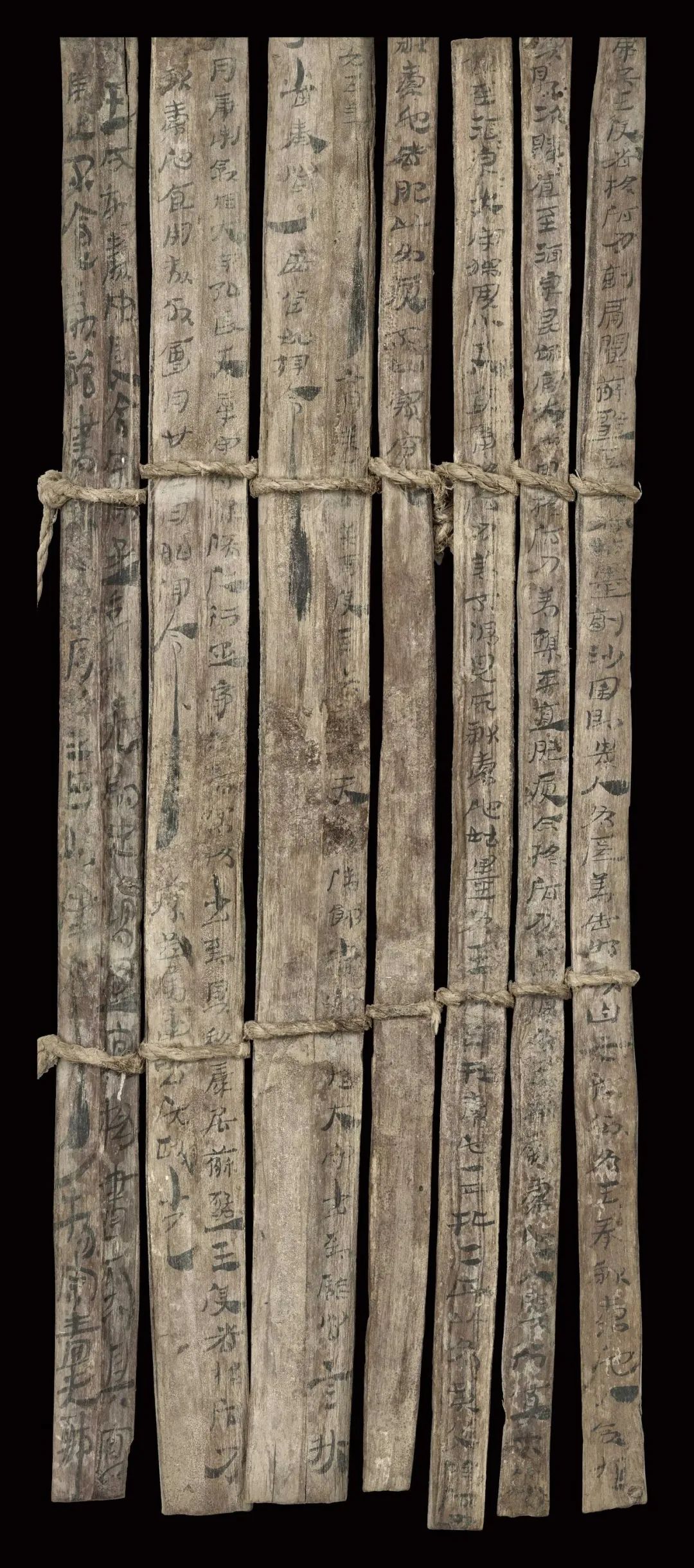
汉竹子滑倒“王王国王的特使书”。新华社新闻社(甘努·竹子(Gansu Bamboo)提供的照片)
真诚地促进竹片和文化文物的“现场”
随着研究材料变得越来越多样化,迫切需要组织和重组已知的历史材料。最近几天,记者访问了各个地方的研究机构,并了解到,一群竹制工人有意识地和主动地参与研究和分类竹滑道,并致力于促进与收集单位合作,以促进协作研究和散装竹book材料的协作研究和开发。
Taking the bamboo and silk center of Wuhan University as an example, the Chinese collection "Baby and silk" was founded in 2006 and was selected as a CSSCI source magazine in 2014. The academic website "Wuhan University Bamboo and Silk Network" has published more than 4,000 papers, developed the "Catalogue of Ancient Chinese Bamboo and Silk Documents and Dictionary Database", and entered a total of 160,000 single-character and dictionary data of bamboo slips in交战的国家和秦和汉朝,并将其开放供同龄人使用。很长一段时间以来,武汉大学与芝加哥大学和其他单位的东亚系合作,举办11个连续学术会议“中国竹子和丝绸科学国际论坛”。
在武汉大学竹子和丝绸研究中心,数据室中充满了与竹条相关的各种中国和外国期刊,以及重要的文件,例如“从楚的交战国家收集”和“ QIN竹子和丝绸的收集”。记者了解到,在湖北地区发掘出的大多数竹条已被整理和出版。 In the contents compiled and published again, the quality of the bamboo slips images, interpretations and annotations has been significantly improved, becoming a more accurate, reliable and convenient version. There are also a variety of important bamboo slips documents that have been included in the plan or received funding. They will be sorted out and published in recent years, including the upcoming "Five Types of Chu Slips Unearthed in Hubei" Volumes, "Sleeping Hudi Western Han Bamboo Slips" (multi-volume) and "Hu Family Grassland Western Han Bamboo Slips" (multi-volume).
At the beginning of this year, Wuhan University released the research results of the first volume of "The Bamboo Slips of the Western Han Dynasty" "Sleeping Tiger Land". Chen Wei used three "one" to summarize the cultural connotation of "Quality Sun" - "a 'diary' of the Han Dynasty for fourteen consecutive years, a grassroots official named 'Yueren', some reactivated historical memories."

Behind the highly concise interpretation is the team's repeated research. Correct conjugation and positioning of fragments is the most difficult. Only by pieced together effective information can we promote text restoration and interpretation. In the conjugation work of "Quality Day", Chen Wei led relevant members to form a six-person "fragmentation" group. The members of the research group usually write their findings into small papers and post them in WeChat group for discussion. After repeated consideration, they can finally "synchronize them into articles".
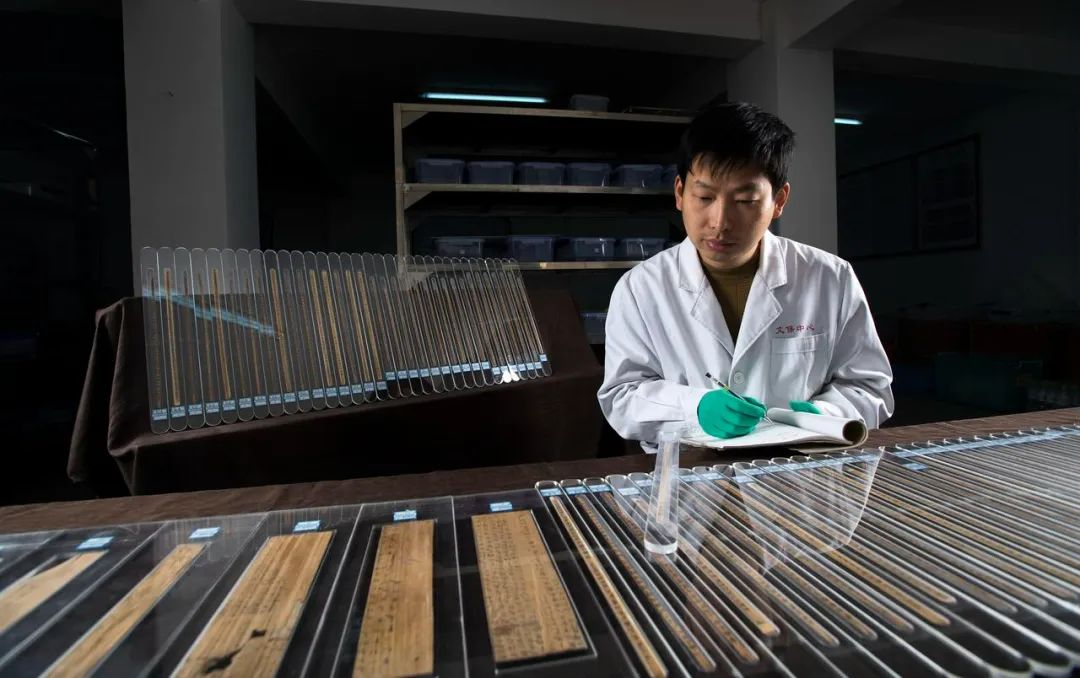
Staff from Jingzhou Cultural Relics Protection Center recorded the restored bamboo slips. (Photo by Xinhua News Agency reporter Xiong Qi on March 16, 2017)
Sometimes the spelling starts from the second half of the simplified branch; sometimes it is necessary to judge the correspondence of the simplified text based on elements such as the above text, font style, and column heights; sometimes a new word is interpreted or modified, which provides a brand new clue and perspective for the spelling... Chen Wei said that it is very difficult to correctly integrate and position the fragments, and it is necessary to try and think about it repeatedly. Sometimes I have good luck and can find several sets of them a day. Sometimes, I sit wither all day long and can't help it. We use "simple in a moment" to inspire each other, strive to advance little by little.
In the Gansu Bamboo Slip Museum, bamboo slips are placed in thin glass tubes, and the ink books are covered with a layer of dim fog against the backdrop of the light. Visitors were immersed in the exhibition hall with a strong fragrance of books. Some stopped and leaned over and approached the bamboo slips, trying to identify and read the classical Chinese characters carefully; some people interacted with the screen to connect the ancient and modern fates of different place names; some people were attracted by the beauty of calligraphy decorated in various places of the museum, and raised their mobile phones to take photos.
"The first time I heard that the name "Yun Quanzhi" was to watch the documentary "Hexi Corridor". When entering the bamboo slips museum, it can almost be said that the viewers can 'ret' the Hexi Corridor again, because there were generals who once drank horses in Hanhai, Princess Jieyou who married far away from the border, and some clerks who had an unknown person who devoted their lives to expand territory to guard the border..." After visiting the museum, tourists with the online name "Sayejiajiang" wrote such words on social platforms.
Since its opening in September 2023, the Gansu Bamboo Slips Museum has become a "Internet celebrity check-in point" in Lanzhou due to its profound Han style heritage. Many traditional culture enthusiasts come in Hanfu to experience the feeling of "time travel". As of now, the Gansu Bamboo and Letters Museum has received more than 300,000 tourists.
In view of the more than 40,000 bamboo slips in the collection from the Qin and Han Dynasties to the Western Jin Dynasty, researchers accelerated the publication of unearthed documents by using infrared scanning, high-definition photography and interpretation at the same time, and promoted a larger-scale bamboo slip research through social sharing. The reporter learned that as of now, except for the "Chunquan Han Sword" that is still being released one after another, other bamboo slips and materials in the collection have been released to the society and academia.
In addition, in order to expand the socialization and popularization of bamboo slips, from 2020, the Gansu Bamboo Slip Museum has cooperated with the School of Literature of Lanzhou University and others to open more than 80 "Simple Reading Classes" to lead college teachers and students to study ancient books together, and inspire college teachers and students to be enthusiastic about "unpopular knowledge".
In the "Golden Haihun" exhibition hall of the Han Dynasty Haihunhou State Ruins Museum in Nanchang, the six wooden slips exhibited are the highest-level official documents that can be seen so far. They are documents submitted by the Marquis of Haihun Liu He and his wife of Haihun, and the Empress Dowager Shangguan. They involve court congratulations, gold medals, autumn invitations, etc., and are of great value to the study of the official document system of the Western Han Dynasty. The words on the memorial are standard Han Li, with beautiful words and solemn and elegant words, and are also rare calligraphy treasures in this period. Tourists often stop in front of the display cabinet for a long time and appreciate it carefully.
"Why did Liu and He choose to write a letter to Empress Dowager Shangguan at the same time? Does it mean that in their hearts, Empress Dowager Shangguan may still give them the strength to support?" Due to the large number of words written in the memorial, the tour guide Li Jiayuan always likes to have some reasonable imaginations with tourists when explaining these six wooden slips. For example, Liu He was submitting a memorial to Emperor Xuan of Han, requesting to participate in the autumn invitation, and his wife was also writing a letter to Empress Dowager Shangguan to express the same wish. This shows that Liu He was extremely eager to restore his sacrificial power, which was of great significance to him. The words and phrases in the memorial "I will be ignorant of my death and I will hear it again" also reveal the carefulness of Liu He and his wife.
In order to "make cultural relics alive", the Changsha Bamboo Slips Museum has joined hands with Hunan Radio and Television to create the "Hear Bamboo Slips" series, focusing on the essence of Chinese Bamboo Slips culture and telling the archaeological discoveries, shape and functions, ideological connotations, and vivid and interesting Bamboo Slips stories. Based on this program, Changsha Bamboo Slips Museum deeply explored the connotation of bamboo slips and held the "The Great Way to Simplify - Theme Exhibition of Chinese Spirit in Bamboo Slips". The director personally gave a lecture and explained the story behind the selected collections, so that children could have a deeper understanding of the Chinese wisdom, Chinese spirit and Chinese values contained in ancient bamboo slips.
"When I mentioned the museum before, I thought of bronzes and gold and silver ware. When I walked into the Changsha Bamboo Slips Museum, I felt that the bamboo slips were also vivid cultural relics full of vitality." Li Can, a citizen of Changsha, said that she signed up for her 9-year-old daughter to participate in the social education activities, and learned about the "past and present" of the bamboo slips in detail, and felt that the restored bamboo slips in the museum were really too precious!
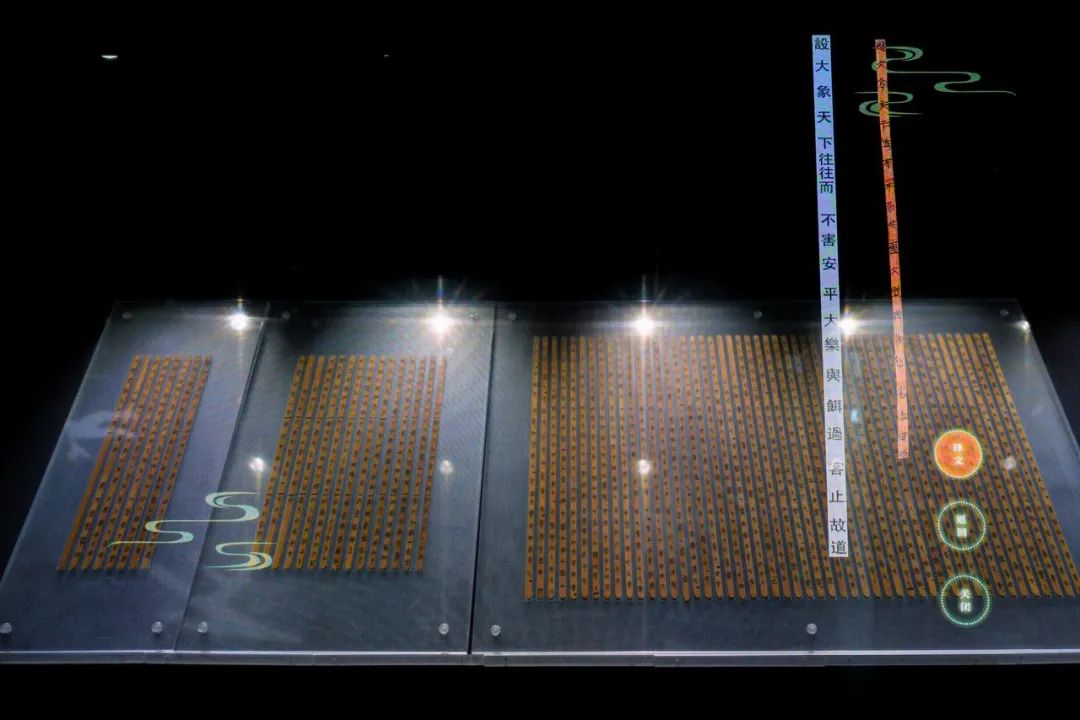
This is an interactive device in the exhibition hall of the Guodian Chujian in Jingmen Museum (photo taken on March 6). Photo by Hu Jingwen, Xinhua Daily Telegraph reporter
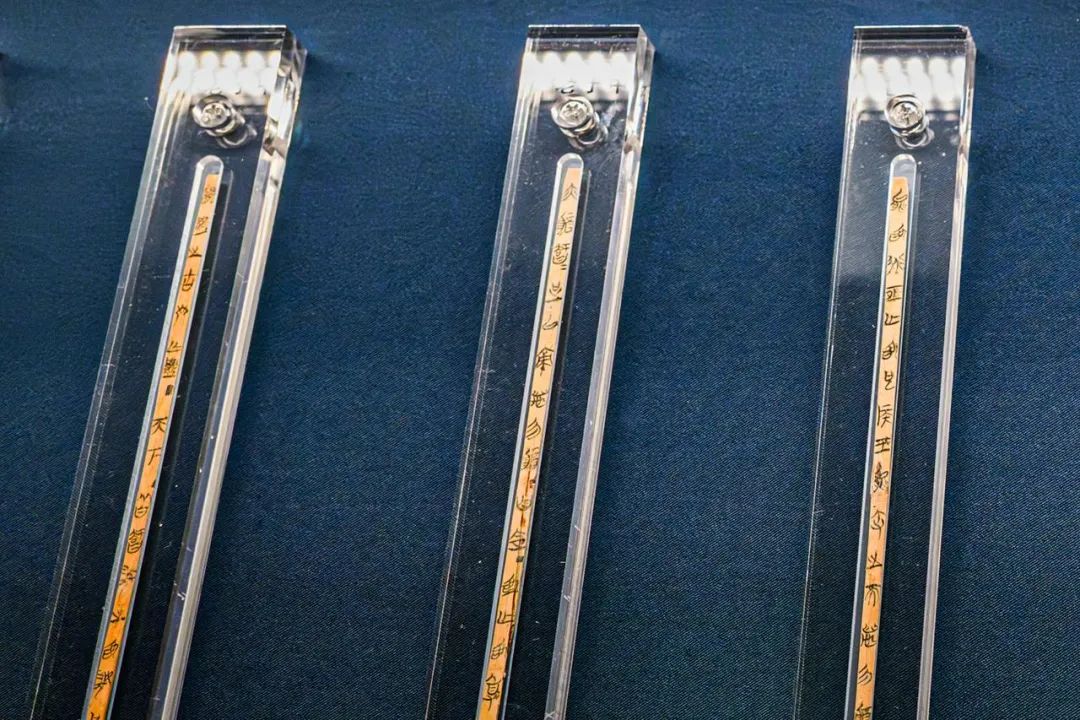
This is the "Laozijia" of Guodian Chushu (photo taken on March 6) exhibited in the Jingmen Museum. Photo by Hu Jingwen, Xinhua Daily Telegraph reporter
As Chinese traditional culture is popular among the public, especially the popularity of ancient Chinese characters and ancient Chinese literature has doubled, and the trend of research on bamboo and silk characters has emerged, and public speeches and popular articles on bamboo and silk culture have also increased one after another. At all levels of society, learning knowledge about bamboo slips has moved from study to public and is understood by more people.
The Guodian Chu Sword Unearthed in Jingmen, Hubei in 1993 is known as "a classic that rewrites the history of Chinese thought". Its publication has set off a wave of research on Guodian Chu Sword at home and abroad. The reporter recently came to the cultural relics warehouse of Jingmen Museum. More than 620 Guodian Chu bamboo slips were packed in a special bag in a group of four and stored in a storage cabinet. There are also small parts of the original silhouettes such as "Laozi" taken out of the warehouse and presented them in the exhibition hall cultural relics display cabinets.
"Technology is the bridge connecting the protection and utilization of cultural relics." Wu Han, head of the collection storage section of Jingmen Museum, said that it is a miracle that the Guodian Chujian can see the light again in more than two thousand years. Whether they can continue for a long time in the future requires the dedicated research and hard exploration of workers in the field of cultural relics protection. We firmly believe that with the continuous innovation and development of science and technology, cultural relics protection will have a stronger support, and audiences will gain better spiritual and cultural experiences. The bamboo slips that have been traveling through more than two thousand years will be preserved forever and will remain fresh.

"Erbin Phenomenon" Erbin people: We found them behind the hot searches and endorsement of their hometown
They silently create "paradise" in the world
What is behind "Fanhua"? Wong Kar-wai said eight words
"Dream Teller" Liu Liangcheng: Taking root in the countryside and "looking back" the world
The Little Days and Great Times in the "Ruby Marriage" of Professor Sichuan University
Ren Jizhou: "The Grassman" never grows old
| This "passport" allows children to see another scene in life
| Why did Penn University posthumously award Lin Huiyin's degree in architecture 100 years later?
Returning to Hometown: Ye Jiaying's Century Search
"Red China" plaque "Go Home" notes
The grass is green and the grass is sent to Shen Peng: I would like to miss Mr.
Producer: Jiang Jinming | Editor: Liu Xiaocao, Ji Ling, Liu Mengni, Lei Kun, Zhao Cen | Proofreader: Rao Xiaoyang
版权声明:本文内容由互联网用户自发贡献,该文观点仅代表作者本人。本站仅提供信息存储空间服务,不拥有所有权,不承担相关法律责任。如发现本站有涉嫌抄袭侵权/违法违规的内容, 请联系本站,一经查实,本站将立刻删除。如若转载,请注明出处:http://www.sudachem.com/html/tiyuwenda/9782.html




